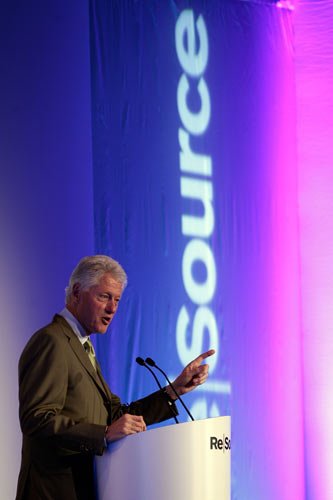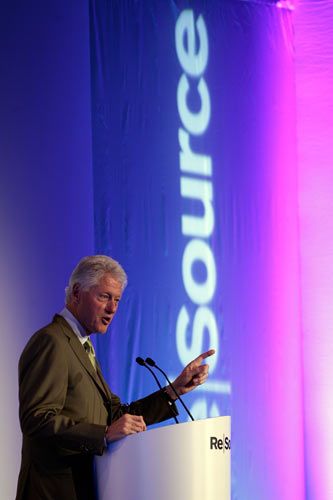PRESIDENT CLINTON TELLS RESOURCE 2012 COOPERATION IS ONLY WAY TO SOLVE RESOURCE CHALLENGES
Published by Gbaf News
Posted on July 25, 2012
4 min readLast updated: January 22, 2026

Published by Gbaf News
Posted on July 25, 2012
4 min readLast updated: January 22, 2026

The most important decision of the 21st century is whether the human race can learn to share its scarce natural resources for the common good, President Bill Clinton told business, finance and political leaders at Re|Source 2012.
The 42nd President of the United States said the world needs to rethink the ways it values the ‘competing claims’ of private gain and common good, cooperation and conflict and the past and the future.
He underlined the dangerous misconception that growth is predicated on the use of natural resources, arguing instead that resource efficiency and renewable technologies will be essential growth drivers in the years ahead. He also urged politicians to prioritise the management of finite natural resources, which can feel remote within short-term political cycles, but which need to be made immediate and relevant to the electorate today. 
President Clinton was speaking at the Re|Source conference where he was the keynote speaker, a gathering of 250 leaders from business, finance, policy and government dedicated to the issue of how the world can manage resource scarcity with economic growth.
His speech reflected a key theme from the conference about the need for greater cooperation between governments, businesses and other organisations to successfully meet the resource challenges the world.
In particular, the private sector has the commercial leverage and influence to drive significant changes – and can create new models in finance to support these changes.
This same principle applies internationally too: “Either we have a policy of shared benefits and responsibility. Or we act as though each struggle is a zero sum game.”
“The only strategy that makes sense is the one that says we are going to share the world with other human beings and we will share its natural resources.” This, he said, “is the fundamental decision of the 21st century.”
In his speech at the University of Oxford, his alma mater, President Clinton said his key ideas and recommendations to tackle issues of sustainability included:
• Pick the low hanging fruit, beginning with becoming more efficient in the use of natural resources, and secondly the development of solar power as an alternative energy source
• Buy time against climate change by going after the rapidly dispersing greenhouse gases which are entering the atmosphere at the moment, e.g. methane
• You can make ‘very big examples in small places’ citing the development of solar power in Haiti following the earthquake and Costa Rica where 92% of electricity is from hydro-power
President Clinton pointed out the strong economic advantages of sustainability. While 870 jobs are created for every $1 billion invested in building a coal fired power station to meet increased energy demand, you can create 7,000-8,000 jobs by spending the same amount retrofitting buildings with more energy efficient measures, he said.
However the current financial system is biased in favour of big infrastructure projects such as coal fired power stations. As a result, investors and financiers are much more likely to back these initiatives than the more complicated and less well understood projects dedicated to improving efficiency.
President Clinton concluded by saying: “We need a different level of consciousness which weighs in a different way the competing claims of the common good and private gain, the competing claims of cooperation and conflict and the competing claims of yesterday and tomorrow.”
In the Q&A which followed, he explained that the key to making long-term decisions in short term political cycles is for politicians to highlight the importance and immediate benefits of these issues, which can otherwise feel remote.
His keynote address concluded the two day event which had earlier heard from speakers including Nobel laureate Amartya Sen, Amory Lovins, named by Time magazine as one of the world’s 100 most influential people, Rt Hon David Miliband MP, former UK Foreign Secretary and David Nabarro, the UN’s Special Representative on Food Security and Nutrition.
There was a strong line-up of speakers from the business and finance community which included Jeremy Grantham, chief investment officer of GMO; Sir Terry Leahy, former CEO of Tesco; Lord Browne of Madingley, Partner at Riverstone; and Jean-Marc Huet, CFO of Unilever.
Re|Source 2012 is a joint initiative hosted by the University of Oxford and its Smith School of Enterprise and Environment in co-operation with The Rothschild Foundation. Its objective is to reframe the debate about sustainability and growth away from the polarised view that economic growth and commercial success are incompatible. It took place in Oxford on July 12-13.
For more information please visit www.resource2012.org and follow us on Twitter https://twitter.com/#!/resource2012
Media contacts
Adam Powell – 07753 832916 / apowell@bell-pottinger.co.uk
Sarah Taylor – 07748 320006 / sarahtaylor@bell-pottinger.co.uk
Christine Johnson – 07826 532895 / cjohnson@bell-pottinger.co.uk
Explore more articles in the Top Stories category











